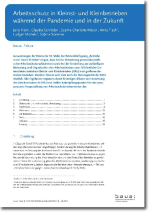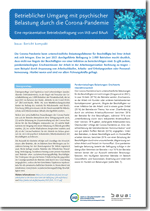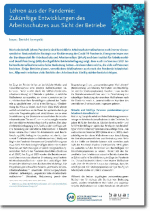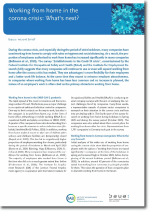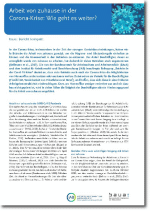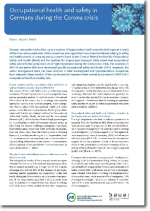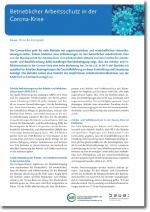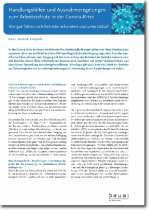- Project number: F 2514
- Institution: Institute for Employment Research (IAB), Federal Institute for Occupational Safety and Health (BAuA)
- Status: Completed Project
Description:
During the Covid-19 crisis, many companies had to make massive changes to their work processes to accommodate occupational safety and health (OSH) and infection control requirements. In the BeCovid study, company managers from approximately 2,000 companies of several sectors and of all company sizes were interviewed about their company's handling of the Corona crisis. The establishments were contacted by telephone at several points in time over a period of about one year. The study was conducted by the Institute for Employment Research (Institut für Arbeitsmarkt- und Berufsforschung, IAB). The Federal Institute for Occupational Safety and Health (Bundesanstalt für Arbeitsschutz und Arbeitsmedizin, BAuA) participated in four survey waves of the establishment survey.
Over the course of the pandemic, the results provided information on different OSH topics. In the first wave (conducted in August 2020) designed by BAuA, the focus was on the operational implementation of infection protection. It was shown that the majority of the companies had taken measures for infection protection at an early stage. Mostly, company management was involved in the establishment of the measures.
The second survey wave (in October 2020) focused on remote work. At an early stage, it was shown that especially large companies will continue to offer remote work after the pandemic. The increasing importance of remote work is likely to challenge work organization as well as OSH.
The third wave of the survey (in June 2021) addressed workplace awareness of mental stress during the Covid-19 crisis. In particular, contact with external persons at work (customers, clients, etc.) was perceived as a burden.
The fourth wave of the establishment survey (in August 2021) again focused on OSH and infection control measures. Furthermore, managers were asked about future significance of OSH. It was shown that OSH has become more important as a result of the pandemic and that many companies are planning to take greater account of it in the future.
Overall, the results reveal a number of challenges for OSH even after the pandemic. Differences between company sizes are particularly noteworthy. In the future, the specific needs of SMEs for the implementation of OSH should be given even greater focus.
